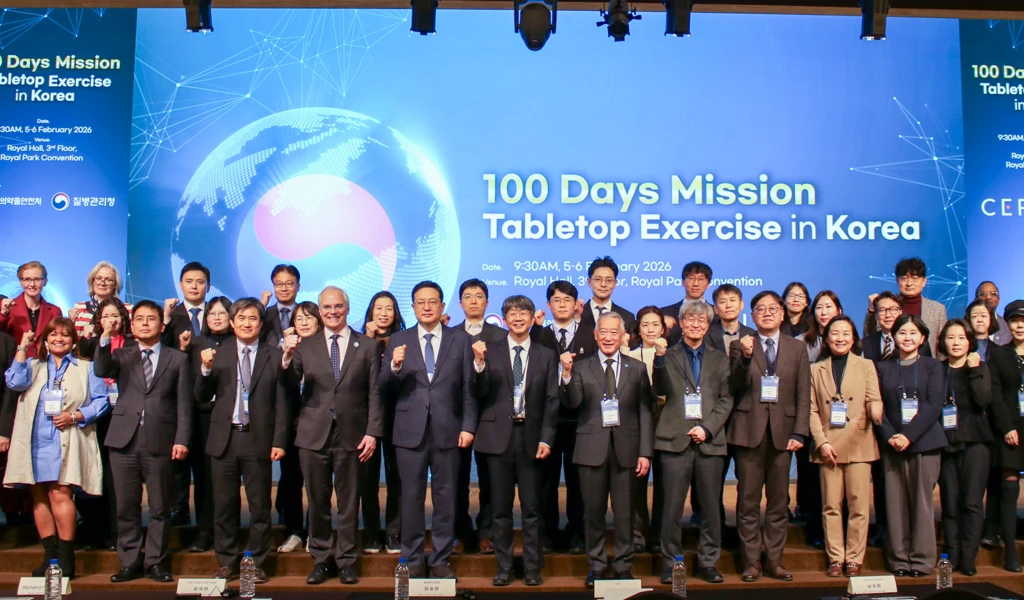- $6.2 million CEPI funding to advance vaccine candidate through preclinical development and Phase I trials
- Clinical testing to be completed in South Africa or another outbreak-affected country on the continent
- Vaccine designed with the cutting-edge mRNA technology that could help rapidly respond to a future threat faster than traditional vaccines
- Rift Valley fever is a deadly mosquito-borne disease affecting Africa and the Middle East
20 January 2025, DAVOS, SWITZERLAND—The South African biotechnology company Afrigen Biologics is pursuing pioneering new research which aims to develop the first-ever mRNA-based vaccine against Rift Valley fever, a mosquito-borne disease affecting countries across Africa and the Middle East.
Supported by a new $6.2 million/ 116 million South African Rand grant from the Coalition for Epidemic Preparedness Innovations (CEPI), the researchers will work with the International Vaccine Institute (IVI) to progress the new vaccine candidate through preclinical development and into Phase I clinical testing in people in either South Africa or another outbreak-affected country on the continent. If successful, it could offer a critical new and locally produced tool to help combat this potentially deadly illness which poses significant risks to human health as well as livestock.
Prof Petro Terblanche, Chief Executive Officer of Afrigen Biologics and Vaccines, said: “The CEPI support to Afrigen provides us with another opportunity to utilize our mRNA technology platform to develop a vaccine for a disease of importance to the African continent and the broader region. The partnership with IVI strengthens and complements the technological innovation required to develop a safe and effective vaccine against a 95-year-old disease.”
South Africa’s Minister of Trade, Industry and Competition Mr Parks Tau,said: “South Africa is committed to innovation and the development of novel vaccines that counter the negative impacts on human health and economic development. The collaboration between CEPI and South Africa’s flagship Biotechnology research, development and manufacturing company Afrigen is valued and central to our commitment to develop and sustain local manufacturing capacity and capabilities on the African continent.”
Minister Aaron Motsoaledi, South Africa’s Minister of Health, stated: “This project and partnership between South Africa’s Afrigen, CEPI and IVI demonstrates again the country's commitment to building capabilities and capacity for pandemic response and preparedness. Health system's resilience and health security are a national priority.”
Dr Richard Hatchett, CEO of CEPI, said: “As the world learned during COVID-19, speed, innovation and access are the pivotal forces that will make or break the spread of an epidemic or pandemic threat. A safe and effective Rift Valley fever mRNA vaccine made in Africa, for Africa, raises the bar in our response to future Rift Valley fever outbreaks, and paves the way to make rapid response mRNA vaccines against similar viruses that could emerge on the continent or in other low- and middle-income countries. This new research will further strengthen the continent’s future preparedness and response capabilities thereby enhancing Africa’s vaccine sovereignty and health security.”
First identified in Kenya’s Rift Valley in the 1930s, Rift Valley fever usually occurs in people, such as pastoral farmers, following direct contact with infected animals, like sheep, goats and cattle, or bites from infected mosquitoes. While the majority of people infected experience mild disease, around 1-2% of those infected can develop the severe haemorrhagic form, which can cause blindness, convulsions, encephalitis and bleeding, and has mortality rates of around 50%.
As a mosquito-borne, and therefore climate-sensitive disease, there is a risk of Rift Valley fever outbreaks spreading to new areas or increasing in frequency or size as a result of extreme or unusual weather events. The disease has also been expanding in range in recent years with outbreaks in the Middle East and Indian ocean islands, hence the need for new Rift Valley fever vaccines.
Although vaccines against Rift Valley fever have been registered for animals, no vaccines are currently available or licensed for human use. It is therefore recognised as a priority target disease in need of urgent R&D by both the World Health Organization and Africa Centres for Disease Control and Prevention.
The new Afrigen vaccine candidate could help combat this threat through leveraging the cutting-edge mRNA technology developed by the company in its role as the Hub for the WHO and MPP mRNA Technology Transfer Programme which aims to build mRNA vaccine development and production capacity in low- and middle-income countries and closer to where outbreaks happen. The early discovery work by Afrigen on this vaccine candidate was funded by the ELMA Foundation.
David Jarvis, Interim CEO of the Industrial Development Corporation (IDC), which holds 49% equity in Afrigen Biologics, commended CEPI for its support: “Growth in Afrigen’s research capabilities will have a positive effect on the company’s trajectory which will facilitate the creation of job opportunities at Afrigen while delivering positive social impact through improving access to life saving vaccines. This aligns strongly to our mandate of enhancing industrial growth and job creation and delivering positive social impact.”
Dr Jerome Kim, Director General of the International Vaccine Institute (IVI), said: “IVI is committed to working with partners to develop a sustainable end-to-end vaccine ecosystem in Africa that supports novel vaccine discovery, clinical trials, manufacturing, delivery, and access. Through the support and partnership of CEPI and Afrigen, we will accelerate a new Rift Valley fever vaccine candidate through preclinical development and into a Phase I clinical trial in humans. Together, we aim to develop and locally produce a safe, effective, and accessible Rift Valley fever vaccine in Africa to protect the most affected regions and people from this deadly, though preventable, disease.”
This is the fourth investment CEPI has made in Rift Valley fever vaccine candidates and the first CEPI-supported Rift Valley fever vaccine candidate using mRNA technology.
In line with CEPI’s Equitable Access Policy, Afrigen is committed to the potential development of investigational stockpiles for use in outbreak situations, an affordable pricing mechanism for the vaccine, and endeavouring to manufacture the vaccine close to where outbreaks may occur to geodiversify regional manufacturing capabilities and minimise supply risks.
In addition, the clinical trial and epidemiological data generated by this project will be published open access to benefit the broader public health and research communities.
Tools and findings advanced through this project also have the potential to support the development of mRNA vaccines against other viruses related to Rift Valley fever.
Afrigen first partnered with CEPI in August 2024 to advance research into Afrigen’s mRNA vaccine technology, in a separate project which could shorten the speed in which mRNA vaccines enter clinical testing and production.
Faster and more readily available mRNA vaccines on the African continent would support progress towards the 100 Days Mission, a goal, spearheaded by CEPI and embraced by South Africa and other G20 as well as G7 nations, to develop vaccines against a novel threat within 100 days from identification.
ENDS
About Rift Valley fever
Rift Valley fever is a mosquito-borne viral illness of humans and livestock that was first discovered in Kenya’s Rift Valley in the 1930’s, but in recent decades has been detected in many African countries and parts of the Middle East, putting more people in more countries at risk of infection.
Because of its impact on both people and animals, Rift Valley fever has profound direct and indirect human health impacts – affecting both lives and livelihoods directly. A ‘One Health’ approach to disease control will work for Rift Valley fever. While vaccines are available for veterinary use, no vaccines are currently available for human use.
Outbreaks of Rift Valley fever have been consistently linked with intense periods of rainfall and flooding including those caused by the El Niño phenomenon which has recently returned after a seven year absence. Heavy rains provide ideal conditions for Rift Valley fever-infected mosquitoes to breed and hatch. As climate change persists, expanding the range of mosquitoes and increasing the likelihood of extreme weather events such as flooding, there is a risk that Rift Valley fever outbreaks will become more frequent and widespread making the development of a protective human vaccine all the more urgent.
CEPI first invested in the development of Rift Valley fever vaccines, with funding support from the European Union Horizon programmes, in 2019. With the addition of Afrigen, CEPI is now supporting four diverse Rift Valley fever vaccine candidate technologies.
About Afrigen
Afrigen Biologics, is a Biotech Start-up company based in Cape Town South Africa, and is a leading innovator in the field of medical biotechnology on the Continent, dedicated to advancing healthcare through cutting-edge research and development. With a commitment to excellence and a passion for innovation, Afrigen strives to deliver transformative therapies that make a meaningful difference in patients' lives.
Having successfully established the WHO/MPP mRNA Vaccine Technology Transfer hub in South Africa, Afrigen is well on its way to locally develop and manufacture mRNA vaccines focusing on disease burden in Africa and other low-middle-income countries. Furthermore, Afrigen through international partnerships and local capacity building has established the first-ever vaccine adjuvant production and formulation technology center on the African continent focusing on next-generation vaccine adjuvants, which are not only geared at preventing disease, but have therapeutic value. One of the founding members of Afrigen was the South African government’s Industrial Development Corporation which holds 49.3% equity in Afrigen while Avacare Health holds 50.7%.
For more information on Afrigen, please visit https://www.afrigen.co.za/.
For more information on Industrial Development Corporation, please visit https://www.idc.co.za/
About CEPI
CEPI was launched in 2017 as an innovative partnership between public, private, philanthropic and civil organisations. Its mission is to accelerate the development of vaccines and other biologic countermeasures against epidemic and pandemic threats so they can be accessible to all people in need. CEPI has supported the development of more than 50 vaccine candidates or platform technologies against multiple known high-risk pathogens or a future Disease X. Central to CEPI’s pandemic-beating five-year plan for 2022-2026 is the ‘100 Days Mission’ to compress the time taken to develop safe, effective, globally accessible vaccines against new threats to just 100 days.



.webp)